Property Offences
1/50
There's no tags or description
Looks like no tags are added yet.
Name | Mastery | Learn | Test | Matching | Spaced |
|---|
No study sessions yet.
51 Terms
What are the four main property offences?
Theft
Robbery
Burglary
Aggravated burglary
Is theft a summary, either-way or indictable offence?
Either-way offence.
So…triable in the MC or CC.
Over £200 then its either-way offence (i.e. multiple thefts then aggregate value).
What is the definition of theft?
S. 1, Theft Act 1968
‘A person is guilty of theft if he dishonestly appropriates property belonging to another with the intention of permanently depriving the other of it
Actus Reus = appropriates property belonging to another
Mens Rea = dishonestly; intention of permanently depriving
Theft - AR
What is the meaning of ‘appropriation’?
Assumption of the rights of an owner.
Widely interpreted.
Switching label on price of goods;
Property pass with owner’s consent (i.e. fake cheque);
Receipt of a gift.
How person came to deal with property is irrelevant.
Theft - AR
Does ‘appropriation’ cover the later assumption of the rights of an owner?
Yes.
S. 3(1), TA 1968
Example - Suki borrows book from library in September. In October, then decides to keep it permanently.
Theft - AR
Can property be stolen more than once if there are multiple appropriations?
[R v Atakpu]
No.
Can be multiple appropriations (i.e. steal car, change registration, respray it). But still only one theft.
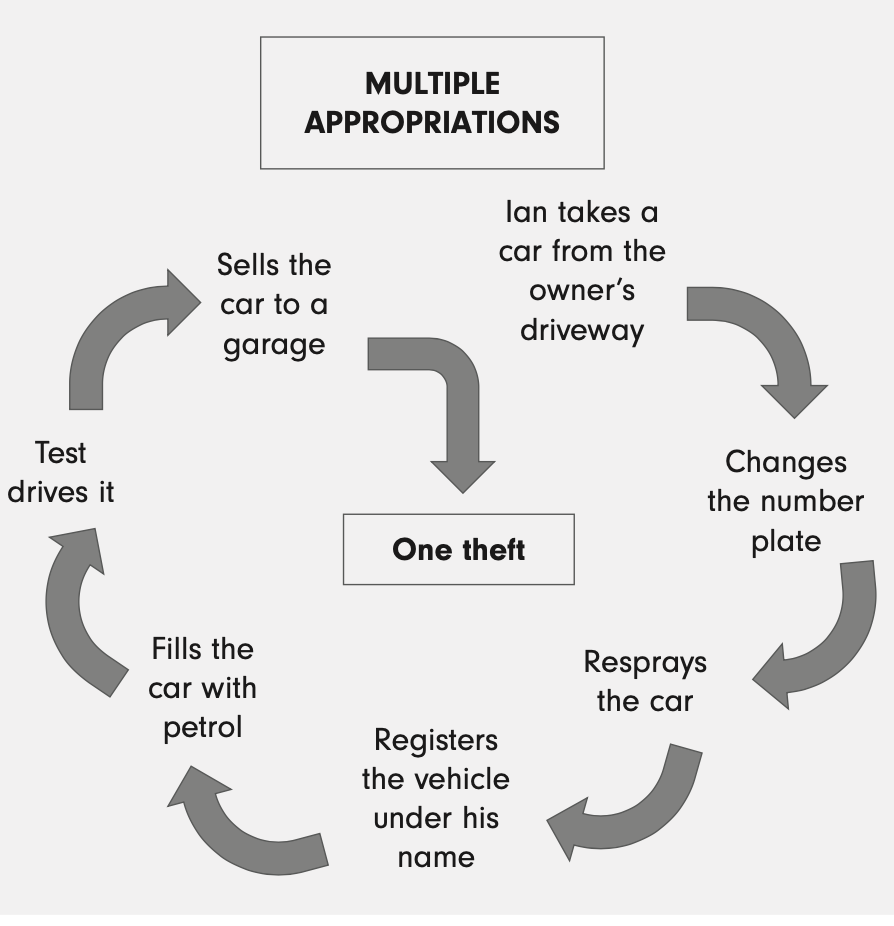
Theft - AR
What is the definition of ‘property’ under the TA 1968?
Money and all other property, real or personal, including things in action and other intangible property.
‘Things in action’ = Chose in action; money in bank account, right arising under trust.
Intangible property = patent for new drug.
Theft - AR
Under what prescribed circumstances can land be stolen?
Trustee in breach of trust;
By person not in possession of land if appropriate anything from land by severing it or after its been severed (i.e. cut and remove neighbour’s branch; steal vegetables).
Tenant takes something fixed to land not supposed to take (i.e. rent house; take greenhouse).
Theft - AR
Can confidential information be stolen?
[Oxford v Moss]
No.
Student saw exam paper in advance.
Held - Not stolen. Information cannot be stolen.
Different outcome if removed paper itself.
Theft - AR
What are other objects that cannot be stolen under the TA 1968?
Mushrooms, flowers, fruit, foliage on wild land.
Wild creatures (exclude pets; captivity).
Theft - AR
What is the meaning of ‘belonging to another’ under the TA 1968?
S. 5(1), TA 1968
Belongs to another where person has:
Possession;
Control; or
Any proprietary right / interest.

Theft - AR
Is theft of your own property included under appropriating property belonging to another?
[R v Turner]
Yes.
Car checked in for repairs. T snuck in and drove off.
Did not want to pay bill; claimed not theft because ownership.
Held - Theft. Garage right to retain possession + control. Unpaid bill.
It ‘belonged’ to them.
Theft - AR
When does the ownership in property belonging to another pass) to someone else (i.e. food, petrol into tank)?
[Edwards v Ddin]
Filled car. Intended to pay. But drove off as insufficient money.
Held - NO theft. Petrol enter tank. D had ownership, possession and control.
Property no longer belonged to another. Lacked MR.
Applies to food. Becomes integral part of body.
Applies to petrol. Becomes integral part of vehicle (i.e. can’t separate fuel from other fuel).
Theft - AR
If property belonging to another is passed to you for a particular purpose - does the property belong to you or the other person?
S. 5(3), TA 1968
Belongs to the other person.
‘…person receives property from or on account of another, and is under an obligation to the other to retain and deal with that property…in a particular way…shall be regarded as belonging to another.
Theft - AR
How did R v Wain expand upon S. 5(3), TA 1968?
D raise money organise events for charity.
Paid into special account for charity. But paid it to himself.
Held - Theft. Under obligation deal with it in a particular way.
Property did belong to another.
Theft - AR
How did R v Hall show a contrary result as to S. 5(3), TA 1968?
D was travel agent. Rec’d money clients pay for flights.
Went into general business account. Unbooked; no refunds.
Held - No theft. Monies not for specific purpose (i.e. general account).
Property did not belong to another.
Theft - AR
Is abandoned property considered as belonging to another?
No.
But depend on circumstances + intention.
X walks past charity shop. Bin bag of clothes at door. Takes one. Not abandoned because intent to donate.
X enters golf course and retrieves balls in lake. Property of golf course. Not abandoned.
Theft - MR
What three situations under the TA 1968 will a person not be dishonest for appropriating property?
S. 2, TA 1968
Person believes:
He has the right in law to the property;
Owner would consent had they know circumstance;
Owner cannot be discovered by taking reasonable steps
NOTE - Subjective test. Not objective. What particular D believed.
Theft - MR
What is the one situation that the TA 1968 states someone is ‘dishonest’?
S. 2, TA 1968
‘A person may be dishonest even though they were willing to pay for the property’.

Theft - MR
What is the test under Ivey v Genting to determine if a D is dishonest?
Ascertain (subjectively) actual state of D’s knowledge / belief as to facts; and then
Determine whether conduct honest or dishonest by objective standards of ordinary, decent people.
So…PR puts before jury evidence as to (1) then up to jury to decide (2).
Theft - MR
Alice takes £10 from the till at the shop where she works to buy alcohol.
Is this dishonesty?
Yes.
Actions clearly dishonest by the standards of ordinary, decent people.
Theft - MR
Alice takes £10 from the till because she forgot her bus fare. She leaves a note explaining the situation. She will repay the money tomorrow.
Is this dishonest?
Less clear. Relationship with boss, company policy and intent to repay all factors.
Determine this then ask jury to decide if objectively dishonest.
Theft - MR
Alice takes £10 from the till because her bus was cancelled. Her route home had she walked is crime-ridden / dangerous. She is aware that company policy forbids this. She intends to repay it tomorrow.
Is this dishonest?
Depend on weight court gives to Alicia’s particular circumstances.
She knows company policy forbidding this.
Theft - MR
Can you recap the relevant order of tests the courts will apply to determine dishonesty under the theft offence?
Clear dishonesty (i.e. shoplifting).
S. 2, TA 1968 partial definitions.
Ivey test.
NOTE - Courts apply assessment in this order.
If ‘clear dishonesty’ (i.e. feuding brothers; one steals £20 off the other then clear issue. No need for further tests).
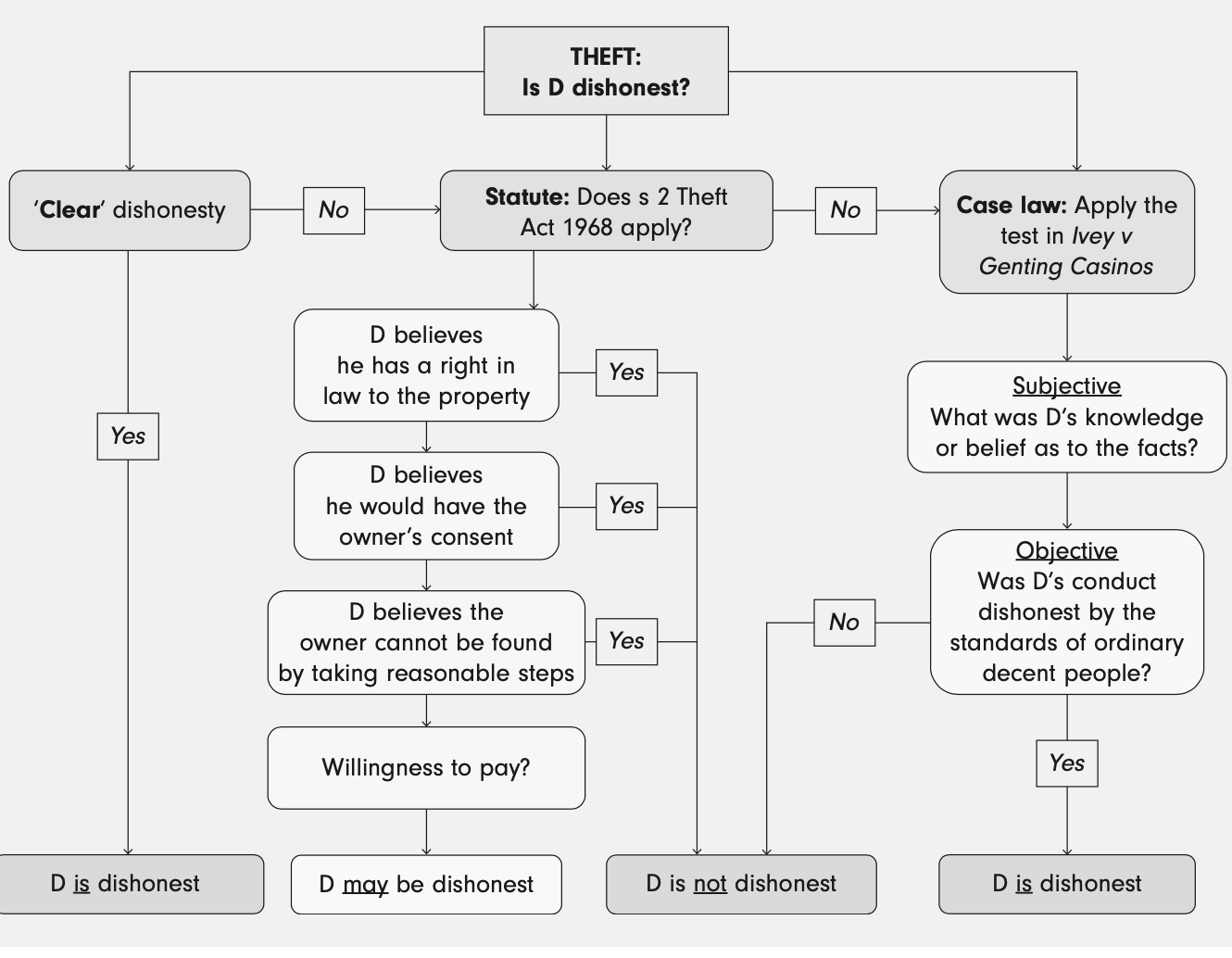
Theft - MR
What multiple meanings does ‘intention to permanently deprive’ have under s.1, TA 1968?
Permanently deprive owner of the item;
Treating property as D’s own;
Parting with item under condition of return which D may not be able to perform (i.e. pawning an item).
Theft - MR
Under the ‘intention to permanently deprive’ owner of their property what does it mean to ‘treat the property as the D’s own’?
S. 6(1), TA 1968
'Treats the property as his own to dispose of regardless of the owner’s rights’
Do not need to dispose of property. Can return after use.
Examples:
X takes credit card. Makes purchase. Returns it after.
X acquires used but unexpired TFL tickets. Sells them on. Treated them as his own.
X writes out cheques for own benefit from company. Argues did not intend to permanently deprive company; bank reimburse fraud. Fails. Treated account balance as his own.
Last point = Chan Man-sin v AG of Hong Kong
Theft - MR
Under the ‘intention to permanently deprive’ owner of their property what does it mean to ‘borrow in circumstances making it equivalent to outright taking’?
[R v Lloyd]
D worked as cinema projectionist. Loaned film to friend. Make illegal copy.
Returned within few hours; available for public showing.
Mere borrowing is not tantamount to intent to permanently deprive.
Unless - It could be said ‘all goodness and virtue had gone.
IBID - Not the case here. Film returned within hours for public.
Is robbery a summary, either-way or indictable offence.
Indictable offence.
Triable in CC only.
Robbery
What is the statutory definition of robbery under TA 1968?
S. 8, TA 1968
‘…if he steals, and immediately before or at the time of doing so, and in order to do so, he uses force on any person or puts or seeks to put any person in fear of being then and there subjected to force’.
Robbery
What are the constituent parts that must be proved for the offence of robbery?
AR and MR of theft;
D used or threatened force
Occurs immediately before or at time of robbery
Motivation is in order to steal.
Robbery
What is the meaning of ‘force’ under the offence?
Simple nudging / pushing of person or against property sufficient (see examples).
NOTE - Question of fact for jury.

Robbery
Against whom may force be threatened?
S. 8, TA 1968
Can be victim themselves or against ‘any person’.
BUT - Victim must be aware of threat to 3rd party.
Example - D tells V will hurt her nearby child if she does not give keys.
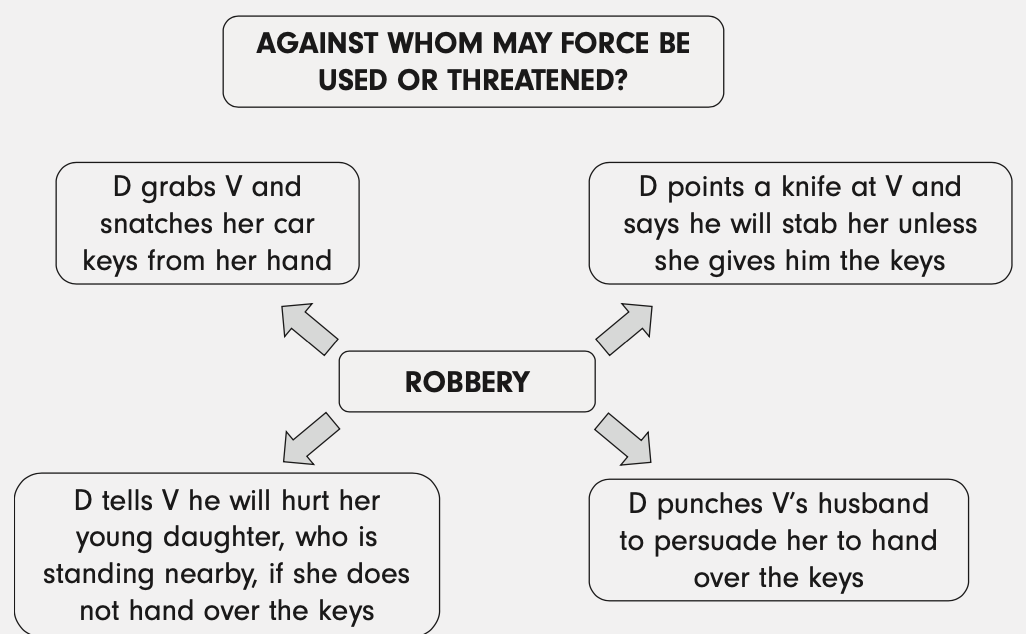
Robbery
Use of threat or force must be ‘immediately before or at the time’ of theft.
How does this operate in practice?
[R v Hale]
D stole from victim’s home.
On way out; threatened young son if called police within 5-minutes.
Held - Threat made as theft ongoing. Robbery.
See also attached example from book.

Robbery
If someone applies force because they dislike the person and then commit a theft on them will this be robbery?
No.
Intent must be to steal. Intent here is because they dislike them.
Example - X punches Y because he dislikes her. Takes Y’s purse from her jacket pocket. Not robbery. Commit theft not with intent to steal.
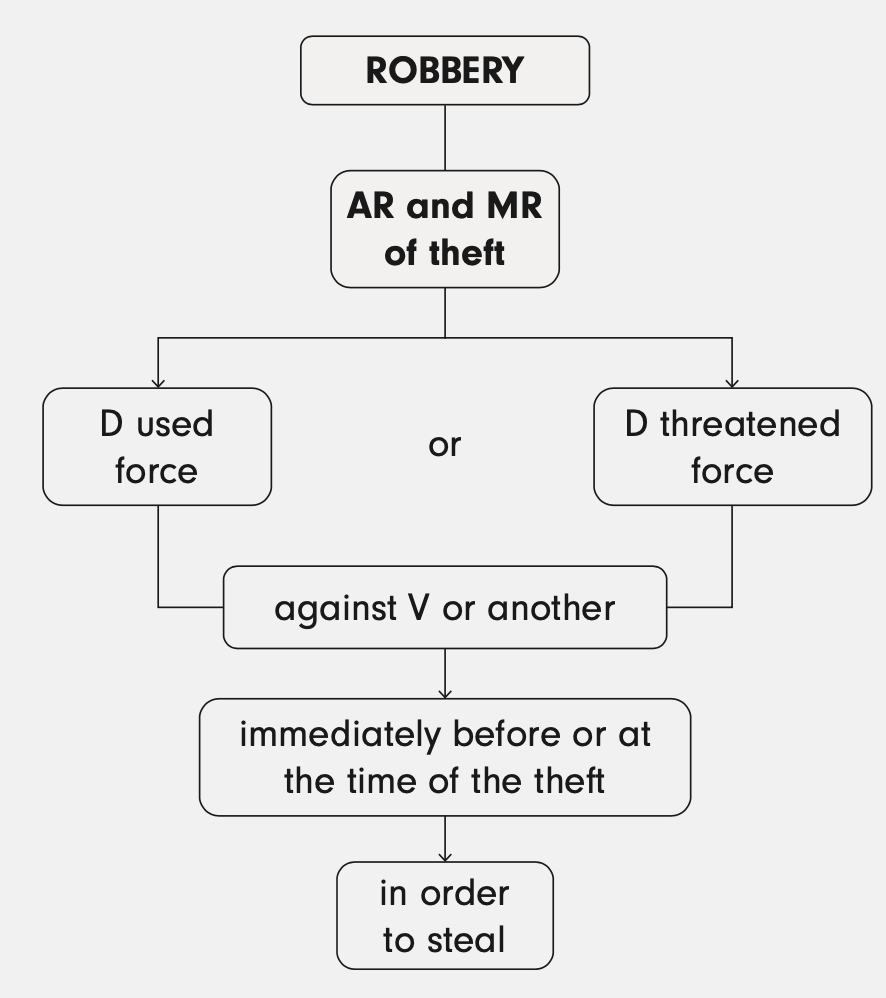
Burglary
Is burglary a summary, either-way or indictable offence?
S. 9, TA 1968
Either-way offence.
Max sentence of 10 years at CC.
14 years if burglary of dwelling.
Burglary
What is the statutory definition of burglary?
S. 9, TA 1968
(A). Enters building (or part) as a trespasser with intent to commit any offence (mentioned below); or
(B). Having entered as a trespasser he commits / attempts theft or inflicts / attempts to inflict GBH.
Offences mentioned above = Stealing, GBH or unlawful damage to building or anything therein.
Burglary
Effectively are there two types of burglary offences under the TA 1968? What are their similarities and differences?
Yes. Two types.
Differences:
(A) = Thoughts going through D’s head.
(B) = D’s actions once inside property.
Little consistency on offences D must intend or carry out (see image).
Similarities:
Both require D to…
Enter
A building (or part)
As a trespasser; and
Know or reckless to be trespasser.
NOTE - Burglary (B) occurs once inside property. Burglary (A) occurs when offender enters building.

Burglary - AR
What is the meaning of ‘entry’ under this offence?
[R v Collins]
Ladder against V’s window; took off clothes. Had sex with V.
Outside building kneeling on sill (innocent burglary). Entered without being invited (burglary).
Held - C must make ‘effective and substantial entry’.
Burglary - AR
Are the following examples of entry?
Climbs though open factory window.
Breaks down office building door; enters.
Leans through shop window; searches through shelves. Lower body stays outside.
Discovered by HH; head and arm inside window.
Inserts hanger through letter box. Hooks keys hanging near door.
Pushes fingertips through door; slightly ajar.
Yes.
Yes.
Yes. Entry was ‘effective’.
Yes. Irrelevant incapable commit crime.
Maybe. Instrument may be treated as extension D’s body.
No. Fingertips inserted only? Not effective.
Burglary - AR
What is the meaning of ‘building’ under the TA 1968?
Structure significant size; degree of permanence (i.e. garden shed, warehouse, offices).
Inhabited vehicles (i.e. houseboats) included.
But someone must live in it.
S. 9(4), TA 1968.
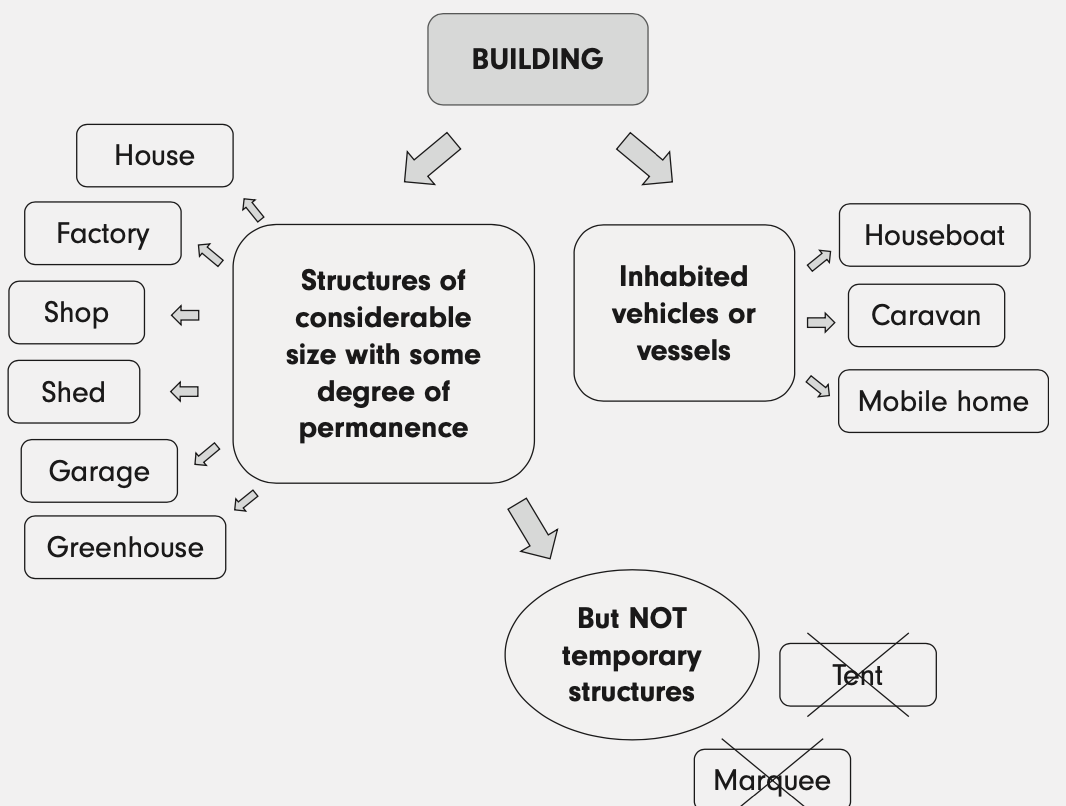
Burglary - AR
What does it mean for a D to enter ‘part of a building’ as a trespasser?
Occur where permitted or invited into building.
But then enter forbidden area. Become trespasser.
Examples:
Mary lives in student accommodation. Walks down shared corridor to kitchen. Enters flatmate’s room whose door is open.
John shopping for clothes in shop. Enters backroom labelled ‘Employees Only’.
Sarah walks behind three-sided movable counter into reserved staff area [R v Walkington].
Burglary - AR
What does it mean for a person to be a ‘trespasser in fact’? When might it be less obvious that a person does not have consent to enter?
Banned from local library. Enter by using face covering. Trespass because no express / implied permission to enter.
Falsely inform someone you’re a PC to gain access. Obtain permission by fraud. Trespass.
Enter off licence intending to steal bottles. Trespass. Invitation on condition purchase products; exceeds permission with intent.
In other words - Assess SBAQ for ‘permission’ and if it’s been revoked.
Burglary - MR
D must either know or be reckless (i.e. foresee risk they do not have permission and continue) as to being a trespasser.
When is this MR required for (A) and (B) under the offence (previous card)?
(A) - D must have MR for entry at time of entry as offence is complete at this point.
(B) - ‘Having entered’ as trespasser means must have MR on entry.
Establish via evidence (i.e. locked building, signs exclude entry, roped area).
Burglary - MR
True or False: Under burglary (A) the D does not actually need to commit the offence (i.e. GBH, theft, criminal damage) to be guilty of burglary.
True.
Sufficient to enter as trespasser with intent to do so.
Example - I enter storeroom as a trespasser with intent to steal a jumper. Successful or not I’ve committed burglary.
Burglary - MR
What additional MR requirements are there for burglary (B)?
D must have MR for theft, GBH or attempt.
But not criminal damage.
Offence satisfied if MR for s. 18 or s. 20 assault under OAPA 1861.
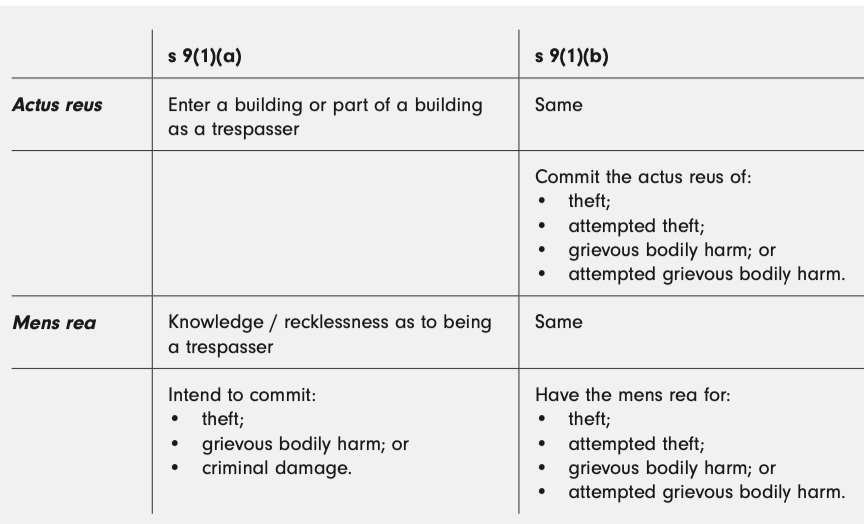
Burglary
Burglary (A) and (B) share similarities and differences.
Review attached images for this and offence summary.
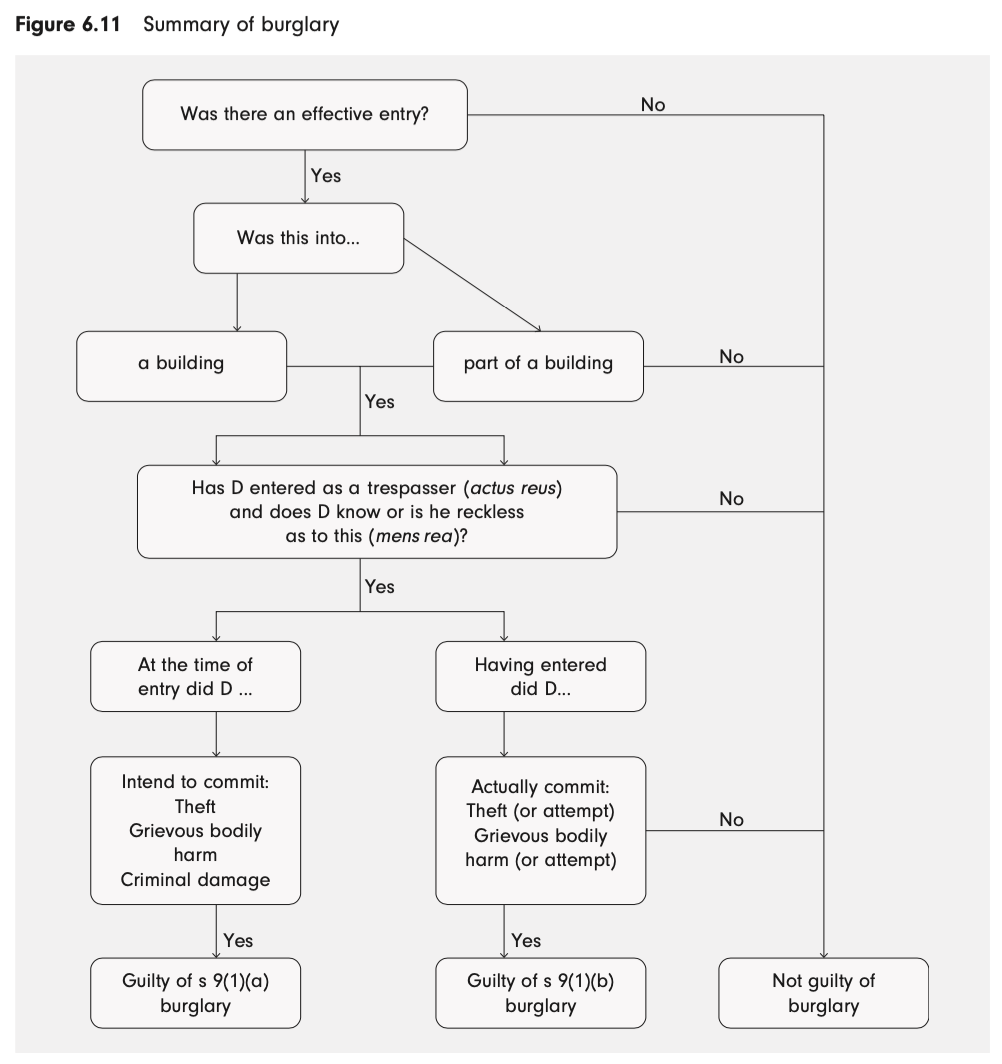
Aggravated Burglary
Is aggravated burglary a summary, either-way or indictable offence?
Indicatale offence.
Max sentence of life imprisonment.
Aggravated Burglary
What is the definition of aggravated burglary?
Commit burglary; possess firearm, imitation firearm, weapon of offence or explosive at time.
Prove burglary (as previous) + possess weapon.
Aggravated Burglary
What is the meaning of ‘weapons’ under TA 1968?
Firearms (air guns, air pistols, imitation firearms).
‘Weapon of offence’ used to cause injury or incapacitate (machete, broken bottle, hammer, rope, handcuffs). Can be anything so long as intended for use to maim.
Explosives.
Excludes ‘fencing sword’. Made for sport.
ALSO - D must know they have item with them.
Aggravated Burglary
For burglary (A) and (B) - at what time must the weapon be on their person to commit the offence of aggravated burglary?
(A) = At time of entry
(B) = When ulterior offence (theft, GBH) committed.
Aggravated Burglary
How did R v Francis demonstrate the importance of possessing the weapon when committing the offence under burglary (B)?
D enter house armed with sticks. Discarded before theft.
Held - No aggravated burglary. Did not have weapon at moment of intent to steal.